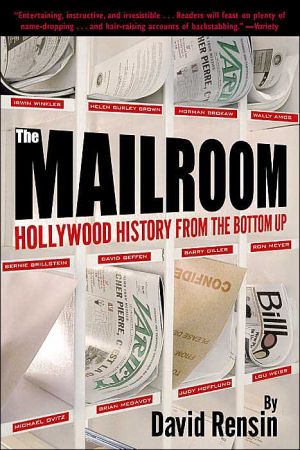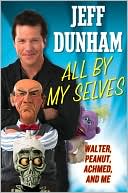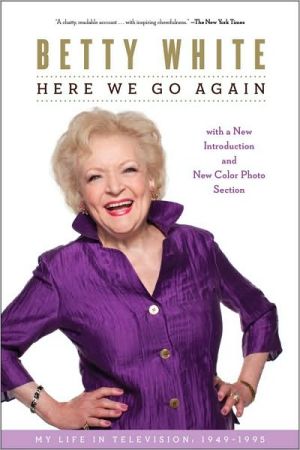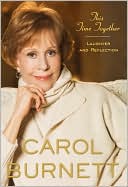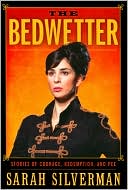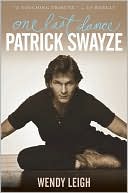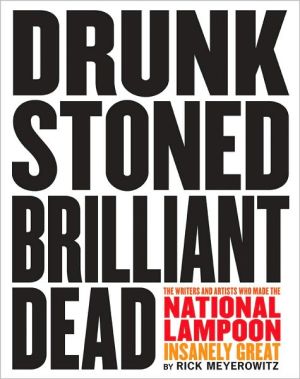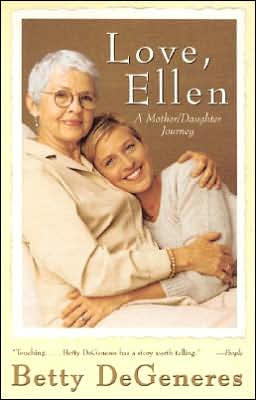The Mailroom: Hollywood History from the Bottom Up
It’s like a plot from a Hollywood potboiler: start out in the mailroom, end up a mogul. But for many, it happens to be true. Some of the biggest names in entertainment—including David Geffen, Barry Diller, and Michael Ovitz— started their dazzling careers in the lowly mailroom. Based on more than two hundred interviews, David Rensin unfolds the never-before-told history of an American institution—in the voices of the people who lived it. Through nearly seven decades of glamour and...
Search in google:
It’s like a plot from a Hollywood potboiler: start out in the mailroom, end up a mogul. But for many, it happens to be true. Some of the biggest names in entertainment—including David Geffen, Barry Diller, and Michael Ovitz— started their dazzling careers in the lowly mailroom. Based on more than two hundred interviews, David Rensin unfolds the never-before-told history of an American institution—in the voices of the people who lived it. Through nearly seven decades of glamour and humiliation, lousy pay and incredible perks, killer egos and a kill-or-be-killed ethos, you’ll go where the trainees go, learn what they must do to get ahead, and hear the best insider stories from the Hollywood everyone knows about but no one really knows. A vibrant tapestry of dreams, desire, and exploitation, The Mailroom is not only an engrossing read but a crash course, taught by the experts, on how to succeed in Hollywood. Publishers Weekly Rensin (coauthor, Don't Stand Too Close to a Naked Man) captures the ambition, manipulative plotting and hustler mentality of a few Hollywood mailroom employees in this series of raunchy, realistic interviews with some top agents who started out in the mailroom. As with any entry-level gig, "the hours are long, the pay... abysmal." Star mailroom grads from the William Morris Agency, Creative Artists Agency, ICM and others voice conflicting views, making Rensin's book an uncompromisingly truthful tell-all of what it takes to make it in the movie biz. William Morris's Norman Brokaw recalls, "I made it a point to develop relationships early on," while Bernie Brillstein's a bit more blunt: "I kissed ass." Most of the agents admit opening up private correspondence and packages, insisting, "everybody did it." Rensin also exposes affairs with secretaries to learn company secrets, fights over use of phones that led to wrestling matches, and homophobia. Sam Haskell, William Morris's worldwide head of television, offers a different take: "Your primary power is your character and your integrity." Rensin furnishes fresh anecdotes about an embarrassed novice who didn't recognize Judy Garland, or another who believed in Marilyn Monroe despite a casting specialist calling her "just another blonde." Clashing views of Mike Ovitz, from "a superb leader" to someone who preferred "style over content" and to whom "appearances were everything," help explain Ovitz's meteoric rise and massive collapse. Most notably, Rensin shows that the road from mailroom to mogul is a rough one. The stories are amusing, intriguing and sometimes horrifying, but Rensin, to his credit, never dilutes sordid details. (On sale Feb. 4) Copyright 2002 Cahners Business Information.
KIDS AT WORK\ William Morris Agency, New York, 1937-1951\ LOU Weiss, 1937 ; Sol Leon, 1938 ; Larry Auerbach, 1944 ;\ Hilly Elkins, 1950 ; Leonard Hirshan, 1951\ My sense of what I had to do was simple:\ get out of the mailroom as fast as I could.\ —Hilly Elkins\ lou weiss: My recollection of all this is unfortunately perfect.\ I was interested in the entertainment business because my uncle was George Burns. My mother was one of his seven sisters, and whenever he was in town, we'd all go to see him perform. I loved being backstage near talented people.\ My mother wanted me to go to college. I'd rather have hung out with the guys and played ball, or gone to a poolroom, or chased the girls, but school is what she wanted. When she died young, in July 1937, I immediately dropped out of school and went to work. Another uncle, Willie Burns—George's manager and writer—called Abe Lastfogel, the boss at the William Morris Agency, and asked him to give me a job of any sort. Nat Lefkowitz and Morris Stoller interviewed me, and in August 1937, when I was nineteen, I got a job as an office boy at twelve dollars a week.\ sol leon: I grew up in Brooklyn. My father was in the women's coats and suits business. He was able to put me through the first year of college at NYU-Heights, but when the Depression hit he said, "Sorry. I can't afford to send you back."\ I got a job and went to Brooklyn Law at night. I sat next to Nat Lefkowitz in class for four years; it was alphabetical. Morris Stoller was also there. Lefkowitz and Stoller worked at William Morris; Nat practically ran the place under Bill Morris Jr. When I became disenchanted with the law, I asked him to find a place for me.\ I started October 1, 1938; I was twenty-five. Nat made me head of the mailroom, while Stoller trained me in business affairs. I had nothing directly to do with handling mail. My job was to tear off the Teletypes and distribute them. Get theater tickets. Get train tickets for Mr. Lastfogel; he didn't fly to California then. Anything that had to be delivered or sorted, I'd delegate. I just told the kids what to do.\ weiss: Before Sol Leon came to oversee the mailroom, "Uncle Henry"—Bill Morris Sr.'s wife's cousin—supervised the office boys. He was an elderly guy who didn't hesitate to crack the whip and make sure we weren't off playing cards someplace. I wish now that I had behaved myself better. I wasted a lot of time. I'd rather have gone dancing than deliver a script, listen to great bands and vocalists in Harlem than sort mail. I hung out at the Savoy Ballroom and watched Billy Eckstine and Sarah Vaughn and Ella Fitzgerald and Ellington. I was also hooked on comics and comedy writers. I loved to go to Lindy's and hang around, try to get myself recognized.\ leon: I wanted to fire Lou Weiss, but I couldn't because he was George Burns's nephew.\ weiss: Maybe because I always dressed better than Sol Leon [laughs]. He'd get very upset.\ larry auerbach: My father was in the dairy restaurant business in Brooklyn. After the stock market crashed, he opened a smaller place but he didn't own the building, and when the city built a new highway, they tore it down, leaving him to sell off his tables and chairs. He was dejected and sad, and the pain of watching him spend more than a year looking for another situation is still vivid.\ I had a work ethic early. When school let out for the summer, I'd always find a job. At twelve I helped my grandparents at their cleaning store, making deliveries. At thirteen I worked for a friend of the family, stacking cans neatly in the Epicurean Department of Gimbel's. The next summer a friend to whom my uncle sold stationery asked me, "Would you like to work in a theatrical agency?"\ I had no idea what that was, so he told me a little bit about it, and I said, "Yeah, it sounds better than delivering suits."\ I got the job at William Morris in June 1944. It was just for the summer, running things around town, mimeographing. I didn't care. It was New York, the big city, exciting and glamorous. I was just shy of fifteen, a little younger than most people in the mailroom. A few years later I was also the youngest ever made an agent at William Morris—to my knowledge. Norman Brokaw claims he was, but what's the difference now?\ hilly elkins: I went to the theater often and from the first was attracted to the idea of putting together what I saw on the stage. When I was fifteen I auditioned for a radio program at WNYC and got in. I ran the sound board, produced, directed, wrote, acted.\ At Brooklyn College my drama coach was Gordon Davidson's dad. Gordon—who has for years been artistic director of the Center Theatre Group/Mark Taper Forum of Los Angeles—and I were friends and opened a tent theater in Belle Harbor. I had a combination job: producer, star, and janitor. It didn't lose too much money, but we ran it into the ground.\ I thought maybe learning the agency business would be a good way of getting a rounded entertainment education. People were in either the theater, nightclubs, or motion pictures. But now it was the beginning of television. Milton Berle and the Colgate Comedy Hour. The only players were William Morris and what was then MCA. I thought it was an interesting opportunity.\ I came in cold. Sid Feinberg interviewed me. I was eighteen; I already had my college degree and was starting law school. I gave it up for a job in the mailroom.\ leonard hirshan: I could say I loved movies and went all the time when I was ten years old, and knew about directors and scripts, and loved the actors, and said to my father that one day I would grow up and be an agent—but that's not true. No one tells their parents they want to grow up to be an agent. Until I applied for a job at William Morris, I hadn't the slightest idea of what the agency business was, or any desire to be in show business. The fates pushed me there.\ I got out of the navy in December 1947 and applied to NYU. I'm a very compulsive person, so I went to school all year long and graduated in about half the normal time, in August 1950, on a Friday. Having been accepted at NYU law school, I started the next Monday, but after a few months I burned out. I decided to take a leave of absence after the first semester, get a job for a while, and then go back.\ I asked my uncle, who had booked shows at the Temple Emmanuel, what kind of temporary situations I could find. He lived in the same building as Nat Kalcheim, an important agent at the Morris office, who told him to have me call Sid Feinberg.\ RULE #1\ weiss: We called the boss Mr. Lastfogel, never Abe. Years later I was sitting with him and Elvis' manager, Colonel Parker at Hillcrest Country Club in Los Angeles, and Colonel Parker said, "Abe, why don't you let Lou call you Abe?"\ Mr. Lastfogel said, "He can call me Abe."\ I said, "I don't call my father Sam. I'm not going to call you Abe."\ It was automatic with all of us.\ hirshan: There was a Nedicks stand in the lobby of our building, 1270 Sixth Avenue, where they sold hot dogs and orange drinks. Whenever I walked by, I'd want something to eat and drink, but I wouldn't do it because I didn't want anyone from the office to think that's where I got my food—until the day I saw Mr. Lastfogel standing there with a hot dog and drink. That's when I realized the democracy of William Morris and dropped all my airs.\ weiss: Mrs. Lastfogel—Frances Arms—was a comic and a performer, and it was rare that she'd ever come up to the office. But one day she did and said, "Get Lou Weiss out of the stockroom." I couldn't imagine what she wanted. To my surprise she said, "Lou, let me see the new dance steps." We put on a record and I danced with the boss's wife. I couldn't say no. Even after I became an agent, whenever she and the boss were in town, she'd say, "Lou, hang around."\ KIDS AT WORK\ weiss: First I was a delivery person. If an actor had to sign a contract, you got on a bus, went to the actor's house. I once waited for Mae West to sign a piece of paper. That was exciting.\ hirshan: I was told to deliver a script to Judy Garland at the Palace Theater. It was a matinee day. I brought it over between shows. I went down to the dumpy-looking dressing rooms, looked in one, and saw a little girl in a ratty bathrobe sitting on the floor watching television. I said, "Excuse me, young lady. Do you know where I can find Judy Garland?" She turned around and said, "I am Judy Garland." It was so embarrassing.\ auerbach: I delivered to Marilyn Monroe. She had just started, but I knew who she was. Her guy at William Morris was Johnny Hyde, a terrific agent, and there was some romance going on between them. I also took something to Gloria DeHaven. She opened the door in her underwear. I was too young to know if I was getting an invitation to come inside, and if I was, I didn't know what to do about it. The only thing I remember is that her underwear was pink. Later I decided that I had really blown it!\ weiss: Belle Baker was not quite Sophie Tucker, but she was an important client who'd made a name for herself in vaudeville. She had an apartment on Central Park West. I had to get her to sign a contract. Her little dog yapped the whole time I stood in the vestibule. When I went out, the dog bit me. I stood there, my leg bleeding, afraid to go back in. At the office I told Morris Stoller what had happened.\ He sent me to a doctor, who said the board of health had to get the dog. But Belle Baker had left town. They found her working in Atlantic City. They grabbed the dog and checked it out for hydrophobia. Thank God it was clean.\ auerbach: By 1944, Sid Feinberg, a lovely man, oversaw the trainees. He was deathly afraid of Nat Lefkowitz, his boss. There was a cutout window between their offices, and when Nat would open it and say, "Sid!" he'd jump. Sid had the tough job of telling us when we did things wrong, and what to do. One day he told me the company wanted to paint the office walls but didn't have the money. Would I be interested in putting together a group of kids and whitewashing the walls? You bet. Then one guy stood on William Morris Jr.'s desk to reach the ceiling and broke the glass top. Of course we denied it was us.\ hirshan: According to tradition, on my first day I was taken in to meet William Morris Jr. He looked up at me from behind his desk and said, "Ah. Another capitalist." I thought, I'm making $38.50 a week. What is he talking about? But he was right. I didn't understand. He was saying that in the agency business if you become successful, you make a good living. My game plan was if I didn't get out of the mailroom in a year, I would go back to law school. If I got promoted, loved what I was doing, but didn't make agent in two years, I'd also leave. But I was willing to give it a chance because almost immediately show business had seduced me.\ DRESS THE PART\ elkins: One joke around the mailroom was the way I dressed—considering the salary. I did that on purpose. Everybody had to wear suits, but there are suits and there are suits. I went over the edge. I was very chic.\ One of my first delivery runs was to the Berle show. Milton, at that time, was Mr. Television. He ran the rehearsals a little bit like Auschwitz, but he got the goddamn shows on. I came in with a package, and he said, "Who are you?"\ "Hilly Elkins."\ He looked at my clothes. He said, "And what do you do?"\ "I'm one of your agents," I said. I don't think he believed me, but he said nothing.\ READ EVERYTHING!\ auerbach: A college education wasn't yet required to get into the mailroom then. All you needed were street smarts and the ability to deal with a situation on your feet. There was no book to read, no school to go to that would tell you how.\ The mailroom was my school. I made it my business to read every piece of paper I could get my hands on. Booking sheets. Internal memos. Meeting minutes. I memorized important telephone numbers. I sopped up information. They didn't tell you to do that or not do that, but only a schmuck wouldn't read stuff before be delivered it. It was very glamorous to learn about the money the performers received. Some got paid so much, the salaries read like telephone numbers, and it's still that way, only now the numbers include area codes. I thought these people must have been like God to get that kind of money.\ elkins: An early assignment was to take Abe Lastfogel's New York bankbooks in for interest to be recorded. I went to ten banks, each with the maximum of $100,000, and I had them stamped. I figured if his New York money alone was a million bucks, it's got to be a good business.\ A MATTER OF DEGREE\ weiss: Everybody wants to be in show business. Today a thousand college graduates show up every June to go into our training program, when there's room for just a few. We eventually drew the line at college degrees to thin out the number of applicants. At least we wouldn't be getting the high school dropouts; we'd get people who were educated and ready to face the next step in life.\ auerbach: They'll kick me in the ass for saying this, but the truth is that the reason a college degree became important was not to have to accept every minority applicant. That's where it started. At some point you could no longer say no to minorities, because you would face legal problems, so they required a degree.
Introduction: Everyone has to Start SomewhereKids at Work: William Morris Agency, New York, 1937-19513A Charmed Life, or A Thirty-Six Short Makes it Big: Norman Brokaw: William Morris Agency, Los Angeles, 194316Traffic: Music Corporation of America, Los Angeles, 1942-195823The Thrill of it all: William Morris Agency, New York, 1955-195835The Mentor: William Morris Agency, Los Angeles, 1957-195954The Man Who Loved Show Business: Sandy Gallin: General Artists Corporation, New York, 196275Sons of the Triple Cross: William Morris Agency, Los Angeles, 1961-196378Everybody Loves Ronnie: Ron Meyer: Paul Kohner Agency, Los Angeles, 1963101Ambition: William Morris Agency, New York, 1961-1967108The Good Mike: Michael Peretzian: William Morris Agency, Los Angeles, 1969131Ties That Bind: William Morris Agency, Los Angeles, 1974-1977139The Guinea Pig: Michael Menchel: Creative Artists Agency, Los Angeles, 1976172The Wild East: International Creative Management, New York, 1978-1981176Thoughtfully Political: Sam Haskell: William Morris Agency, Los Angeles, 1978; Rob Carlson: William Morris Agency, Los Angeles, 1989194If I Do Say So Myself: Jeremy Zimmer: William Morris Agency, New York, 1979201Our Job is to Say Yes: Judy Hofflund: Creative Artists Agency, Los Angeles, 1982209For the Love of Mike: Assisting Michael Ovitz: Stuart Griffen: Creative Artists Agency, Los Angeles, 1982; David "Doc" O'Connor: Creative Artists Agency, Los Angeles, 1983214Pressure, Pressure, Pressure: Creative Artists Agency, Los Angeles, 1984-1990225Outpost on Sixth Avenue: William Morris Agency, New York, 1981-1986273Came and Gone: William Morris Agency, Los Angeles, 1980-1986292Brothers in Arms: Brian Medavoy and Kevin Misher: Creative Artists Agency, International Creative Management, InterTalent, Los Angeles, 1986-1990321As the Mailroom Turns: International Creative Management, Los Angeles, 1989-1993331Jeremy's Kids: United Talent Agency, Los Angeles, 1991-1994357In Your Face! ... with Love: Adriana Alberghetti: Endeavor, Los Angeles, 1995395Stairway to Heaven: Creative Artists Agency, Los Angeles, 1994-1996408Kids at Work: William Morris Agency, Los Angeles, 1997-1999427Acknowledgments437
\ Publishers WeeklyRensin (coauthor, Don't Stand Too Close to a Naked Man) captures the ambition, manipulative plotting and hustler mentality of a few Hollywood mailroom employees in this series of raunchy, realistic interviews with some top agents who started out in the mailroom. As with any entry-level gig, "the hours are long, the pay... abysmal." Star mailroom grads from the William Morris Agency, Creative Artists Agency, ICM and others voice conflicting views, making Rensin's book an uncompromisingly truthful tell-all of what it takes to make it in the movie biz. William Morris's Norman Brokaw recalls, "I made it a point to develop relationships early on," while Bernie Brillstein's a bit more blunt: "I kissed ass." Most of the agents admit opening up private correspondence and packages, insisting, "everybody did it." Rensin also exposes affairs with secretaries to learn company secrets, fights over use of phones that led to wrestling matches, and homophobia. Sam Haskell, William Morris's worldwide head of television, offers a different take: "Your primary power is your character and your integrity." Rensin furnishes fresh anecdotes about an embarrassed novice who didn't recognize Judy Garland, or another who believed in Marilyn Monroe despite a casting specialist calling her "just another blonde." Clashing views of Mike Ovitz, from "a superb leader" to someone who preferred "style over content" and to whom "appearances were everything," help explain Ovitz's meteoric rise and massive collapse. Most notably, Rensin shows that the road from mailroom to mogul is a rough one. The stories are amusing, intriguing and sometimes horrifying, but Rensin, to his credit, never dilutes sordid details. (On sale Feb. 4) Copyright 2002 Cahners Business Information.\ \ \ \ \ Kirkus ReviewsFrom veteran Hollywood coauthor Rensin (Tim Allen's Don't Stand Too Close to a Naked Man, 1994, etc.), an oral history of a crucial Tinseltown institution, related by some folks who make Machiavelli look like a pussycat. Since the day they filmed The Squaw Man, the only way to become an agent, with all the appurtenant expense account rights and backstage privileges, was to start in the mailroom wearing a 36-short suit. Of course, you had to have a close relative in the industry. Now, to be a suit to the stars, any size suit (or even a dress) will do. Nepotism, though, is still a good thing. Oppressive work conditions have continued at William Morris, MCA, ICA, CCA, Intertalent, and wherever else the new guys dream of delivering scripts to naked actresses. (A few are lucky; others encounter Charles Grodin in boxer shorts.) Drive Mrs. Lastfogel, steam open the mail, fill a theater seat and the agent's fountain pen, eavesdrop on every phone call, get coffee, score drugs, squirm until you get everything right, and you may earn access to the Hillcrest and the best clubs on both coasts. It's all part of the training program Rensin's schmoozing, spritzing interviewees went through, working their way from dispatch to assistant's desks and eventually becoming agents in the Nightclub, Band, Variety, TV Guest, or Literary departments-or quitting. The talk is fast and frank. One agent is characterized as "a prick of pricks," another as "a pompous prick and petty despot." A thought for another: "May he rot in hell." Mailroom alumni include Wally Amos, David Geffen, Barry Diller, and The Great Ovitz, often confused with The Great Oz. Entertainment industry junkies may enjoy taking an armchair meetingwith these people-no stepping into Ovitz's Guccis, but no fear of getting fired either. Edgy, frenetic, and entertaining reports from the room that launched a thousand deals.\ \
